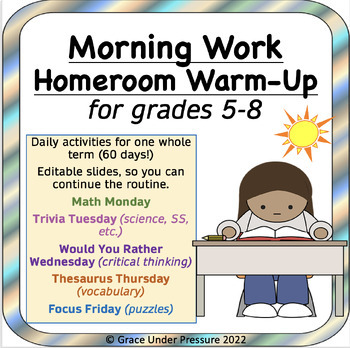Intermediate/Middle School Morning Work & Homeroom Warm-Up: Grades 5-8
- PPTX
Description
This resource is a helpful tool for your morning work or homeroom routine with intermediate/middle school students! This powerpoint presentation includes homeroom warm-up activities for each day of the week with enough for one whole term (60 days!).
The slides are editable, so you can make more for future terms. You could also ask students to help make more slides as an activity for early finishers.
If you are looking for a second term (60 more days) of these activities, they can be found here!
How to Use:
Present a slide each morning on your interactive whiteboard. Students can have a special notebook that they use each day for this task, they could use mini whiteboards, or whatever routine works best for your group.
The Monday and Tuesday tasks have answers included- you just leave present mode and use your cursor to move the box covering up the answer when you are ready to show your students.
Start the day with a bit of fun and a consistent routine. This will set the tone for the learning to come!
Questions address many areas of the curriculum:
Math Monday: On Monday your students will encounter word problems and prompts about ratio, area, money math, patterns, logic puzzles, and more! These will be a great review for previously learned information or they could prompt a quick mini-lesson for new material.
Trivia Tuesday: On Tuesday your students will be asked questions about geography, grammar, biology, financial literacy and more! Each question is designed to address an area of the curriculum from prior or future years.
Would You Rather Wednesday: Wednesday might become your students' favourite! These prompts will stimulate some great class debates and discussions and help students see issues from both sides. There is no right answer, students just need to provide evidence for their opinions.
Thesaurus Thursday: On Thursday your students will work to think of synonyms for over-used words: like the dreaded "nice". This will help increase their vocabulary.
Focus Friday: End your week with fun puzzles and games that will get kids thinking and collaborating with one another.
These activities are great for distance learning or in-class learning.





